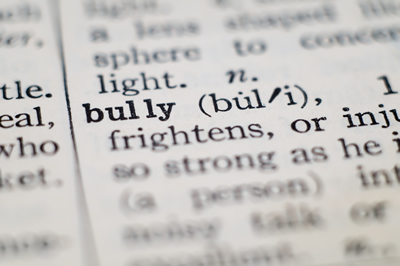Defining Bullying
Posted by PLB Registrar · 1 Comment

 Ask yourself these two “yes” or “no” questions:
Ask yourself these two “yes” or “no” questions:
1: Do I enjoy hurting people who are weaker than me and doing so repeatedly?
2: Have I sometimes done things to people that upset them?
If you are like most everyone, you answered No for Question 1 and Yes for Question 2.
The first question corresponds to Part I of the legal definition* of bullying below. This describes a coward who intentionally hurts people who are weaker than themselves and does it over and over again. Such people exist, but they are rare (only 1% of people).
Part I: Among researchers, bullying is commonly understood as aggressive behavior that:
(a) is intended to cause distress or harm,
(b) exists in a relationship in which there is an imbalance of power or strength, and
(c) is repeated over time (Limber, 2002; Nansen et. al., 2001, Olweus, 1993).
The second question corresponds to Part II of the legal definition* of bullying below. According to this any mean behavior is bullying.
Part II: Bullying may involve physical action, words, gestures, or social isolation. Although bullying may involve direct, relatively open attacks against a victim, bullying frequently is indirect, or subtle, in nature (spreading rumors, enlisting a friend to assault a child (Limber, 2002; Olweus, 1993; Rigby, 1996).
In other words, if you insult people, roll your eyes when they say something you think is stupid, talk about them behind their backs, refuse to be their friends, or talk sarcastically to them, you are being a bully according to this broad definition.
Human beings aren’t angels and few are saints. Almost everyone does these kind of mean things sometimes. There is a good chance that someone in every family, such as a child, parent, or spouse, complains that another family member has been mean to them.
So, either almost no one is a bully, or almost everyone is a bully. It just depends upon whether you use Part One of the legal definition* or Part Two.
Note: Anti-bullying laws vary from state to state and location to location.
Please check with your institution for specifics in your area.
* The legal definition of bullying is taken from an article called, State Laws and Policies to Address Bullying in Schools, by Susan Limber and Mark Small, School Psychology Review, 2003, Volume 32, No. 3, pp. 445-455.
From Professional Learning Board’s online continuing education course for teachers: Bullying – The Golden Rule Solution




I agree completely with way this broad definition of bullying determines to a large extent how we respond. Unfortunately, this broad definition seems to be the accepted view nowadays, especially among parents, which in my opinion, handcuffs administration when dealing with student behavior that would otherwise be defined as interpersonal conflict or cliquishness among students.
Not long ago I read an interesting article noting research from another point of view. Excerpts from the article, “Bullying is Exaggerated, Says Childhood Expert,” by, education correspondent, Anushka Asthana reads as follows:
“The level of playground bullying is being exaggerated and children must learn to cope with name-calling and teasing to help them develop resilience, a childhood expert says. In a book to be published tomorrow, Tim Gill, a former government adviser who led a major review into children’s play, argues that mollycoddling children by labelling ‘unpleasant behaviour’ as bullying is stopping them from building the skills they need to protect themselves. ‘I have spoken to teachers and educational psychologists who say that parents and children are labelling as bullying what are actually minor fallingsout,’ said Gill, the former director of the then Children’s Play Council, who is currently advising the Conservative Party’s childhood review. ‘Children are not always nice to each other, but people are not always nice to each other. The world is not like that. One of the things in danger of being lost is children spending time with other children out of sight of adults; growing a sense of consequence for their actions without someone leaping in,’ he told The Observer.”